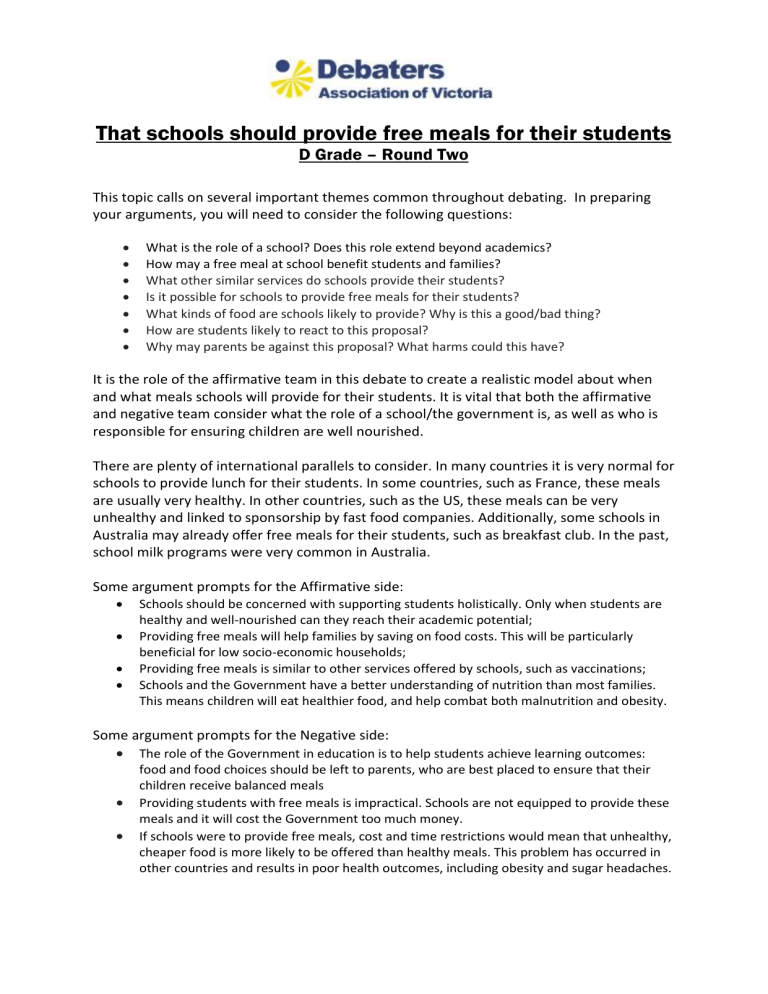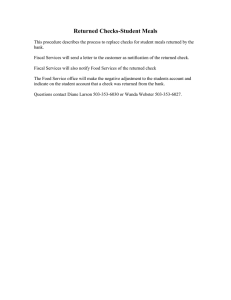Free School Meals Debate Topic Brief
advertisement

That schools should provide free meals for their students D Grade – Round Two This topic calls on several important themes common throughout debating. In preparing your arguments, you will need to consider the following questions: What is the role of a school? Does this role extend beyond academics? How may a free meal at school benefit students and families? What other similar services do schools provide their students? Is it possible for schools to provide free meals for their students? What kinds of food are schools likely to provide? Why is this a good/bad thing? How are students likely to react to this proposal? Why may parents be against this proposal? What harms could this have? It is the role of the affirmative team in this debate to create a realistic model about when and what meals schools will provide for their students. It is vital that both the affirmative and negative team consider what the role of a school/the government is, as well as who is responsible for ensuring children are well nourished. There are plenty of international parallels to consider. In many countries it is very normal for schools to provide lunch for their students. In some countries, such as France, these meals are usually very healthy. In other countries, such as the US, these meals can be very unhealthy and linked to sponsorship by fast food companies. Additionally, some schools in Australia may already offer free meals for their students, such as breakfast club. In the past, school milk programs were very common in Australia. Some argument prompts for the Affirmative side: Schools should be concerned with supporting students holistically. Only when students are healthy and well-nourished can they reach their academic potential; Providing free meals will help families by saving on food costs. This will be particularly beneficial for low socio-economic households; Providing free meals is similar to other services offered by schools, such as vaccinations; Schools and the Government have a better understanding of nutrition than most families. This means children will eat healthier food, and help combat both malnutrition and obesity. Some argument prompts for the Negative side: The role of the Government in education is to help students achieve learning outcomes: food and food choices should be left to parents, who are best placed to ensure that their children receive balanced meals Providing students with free meals is impractical. Schools are not equipped to provide these meals and it will cost the Government too much money. If schools were to provide free meals, cost and time restrictions would mean that unhealthy, cheaper food is more likely to be offered than healthy meals. This problem has occurred in other countries and results in poor health outcomes, including obesity and sugar headaches. Individuals should be given information to make their own food choices. If we don’t teach kids and parents to make these choices now, it may be too late. Links http://www.care2.com/causes/5-reasons-to-give-all-kids-a-free-school-lunch.html https://www.artinstitutes.edu/blog/unhealthy-school-lunches-not-making-the-grade http://distractify.com/food/2015/02/06/sweetgreen-international-school-lunches1197823898 http://parenting.blogs.nytimes.com/2015/09/21/parents-not-schools-should-decide-whatto-pack-for-lunch/?_r=0


